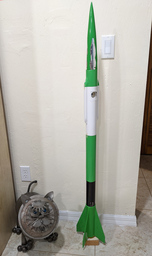   |
| Likes |  |
| Skill | 5 |
| Length | 51.37" 130.48cm |
| Diameter | 2.12" 5.38cm |
| Weight | 4.23lbs 1.92kg |
| Parachute | 28" 71.12cm |
| Drogue | 12" 30.48cm |
| Motor Mount | 54mm |
| Deployment | Dual-2 Computers |
Panda 2
Description
Design did not work out. Became unstable due to front fins nearing mach. This rocket is no more. There will be no Panda 3.
While many of the parts are from the original Panda, there are significant improvements and changes to the original design.
While probably not necessary, since performing a partial rebuild, I might as well make incremental significant improvements.
Changes so far:
Hardware
- Increased overall height of tube portion of electronics bay by 10mm on top. This decreases the size of the coupler+bulkhead extension up into the nosecone thereby increasing the volume for the shock cord and drogue chute, making it a less tight fit. While the previous design caused no issues on the last flight, it made drogue chute packing tedious and accident prone.
- Increased overall height of tube portion of electronics bay by 18mm on bottom. On previous iteration, when the nose deployed early, this was the failure point separating the rocket into two pieces. I know that all is probably fine with this joint, but if I'm rebuilding it, having some extra surface area for the coupler/bulkhead increases structure strength tremendously.
- Built the bay 3d print shell using carbon fiber PC rather than PLA2. While this material contains carbon fibers, tests confirm 900MHz band, bluetooth, and cell signal pass through this material with no issues. While I had no problems with strength of bay, this bay will be significantly stronger and lighter. The specific brand I am using for CF PC is strong and has fairly detailed specifications: https://www.3dxtech.com/product/carbonx-pc-cf/
- Lower coupler and bulkhead has been increased in thickness by 1.5mm and is now a min. thickness of 3.5mm. Top of coupler reaches into bay frame by 8mm more for a total of 22mm. Bulkhead has been moved down 16mm allowing for more storage of wiring. Total coupler length is now 7cm.
- I'll create a kevlar loop around the electronics bay with the intent to keep the entire rocket together if things become catastrophic.
- Like the last bay: Bay is wrapped in a few layers of 2oz glass on the outside, followed by a coat of finishing epoxy with add of colloidal silica, followed by auto primer/filler and much sanding.
- Like the last airframe: Tube for airframe beneath bay is a custom roll my own tube made from laminations of carbon fiber+epoxy. This was then wrapped in a few layers of 2oz glass for easier finishing, followed by a coat of finishing epoxy with add of colloidal silica, followed by auto primer/filler and much sanding.
Electronics
- Completely redesigned 3d interior bay to ease work necessary when mounting the complex electronic components and wiring inside the bay. See https://www.insanerocketry.com/main/displaymessagelist/-8975363303981560303/
- Unlike the first Panda, primary electronics will be using my own new custom designed shield utilizing the Arduino Nano 33 BLE. I have had many successful flights with this design. The NEXT rocket has the original shield in it (and previous EZI-65) with many successful deployments that this will mirror. Read more details about NEXT electronics here: https://www.insanerocketry.com/main/displaymessagelist/2853948916500483347/ The Panda 2's final primary electronics are outlined here: https://www.insanerocketry.com/main/displaymessagelist/-5758789762341846124/The previous Panda 1 used different unproven electronics and likely an electronics glitch deployed the drogue 1.1 seconds after takeoff. Refer to photo and text here for Panda 1 failure event: https://www.insanerocketry.com/main/displayimage/4469411140629513786/
- Backup electronics will be using a raven4, unlike previous design which used a stratologger.
Drogue engage on port 8 (nose deploy) 0.6 grams FFFFg black powder backup 0.8 grams
Main engage on port 9 (aft deploy) 1.6 grams FFFFg black powder backup 2.0 grams
Summary | |||||
| Total Launches | 1 | Highest Altitude | 1453 ft 442.87m | Cumulative Altitude | 1453 ft 442.87m |
| Total Fail | 1 | Highest Velocity | 693 MPH 1115.73km/h | Average Altitude | 1453 ft 442.87m |
| Average Motor | K | Average Thrust | 514 | Total Thrust | 514 |
| Motor Sum | K | Motor Failure | 0 | Average Speed | 693 MPH 1115.73km/h |
Averages & cumulative are calculated if there are actual values present, not just estimated. None of the averages or weighted. Please do not populate actual values with estimates.
# = Number of Launches ? = EstimatedLaunches
| Date | Title | Likes | Weight | # | Status | Altitude | Velocity | Motor | ||
| Panda 2-Fail - No more Pandas |  | 4.23lb. 1.92kg | 1 | Fail | 1453 ft 442.87m ?10000 ft ?3048.00m | 693 MPH 1115.73km/h | K513-FJ |




































